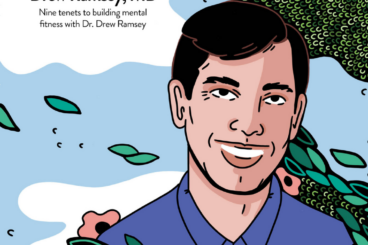Table of Contents
Let’s talk about mental fitness. Maybe you’ve been seeing this phrase around. It’s a new way of thinking about mental health. It’s something that my team and I are really excited about and it’s the subject of our new course, Healing the Modern Brain. Mental fitness, as I define it, is all of the habits, skills, knowledge and patterns in your life that make your life more enjoyable and protect your mental health. It’s the things that we do in our everyday life to take care of ourselves. Now, this isn’t going to prevent all of our mental health problems, but the idea is, that over time as we’re really engaged in caring for our mental health as well as we care for our physical health and that you have tools, skills, exercises that help you build your mental health. So what are the pillars of mental fitness? We’ve done a deep dive on everything that has evidence and science behind it that can help promote your overall sense of wellbeing, mental health, and of course your brain health.
Sleep
First, let’s start with some of the absolute basics. I bet you know a lot of these, but people still struggle with them and also there is a lot of misinformation. Let’s start with number one, sleep. You can’t have good mental health without sleep. So often I hear people say, I get about seven or eight hours a night. This is not the way we want to think about our sleep. We want to think about your quality. We want to think about how you can track your sleep. So many people suffer with insomnia, trouble falling asleep, trouble staying asleep, and so really optimizing your sleep is important. Sleep is when our brain gets rid of all of its waste. It’s a breakthrough in science that we’ve just understood over the last 10 years. There is an entire system within the brain that we didn’t know about. Sleep is critical to mental fitness.
Nutrition
Number two is nutrition. That probably doesn’t surprise you coming from me as a nutritional psychiatrist, but the brain and mental health run on a select set of nutrients, vitamins, minerals and phytonutrients that are found in whole foods. This message has gotten lost. A lot of individuals have focused their nutrition and their food plan around ethical ideas such as meat or no meat and there is a lot of misinformation about plants. The bottom line is traditional dietary patterns, which are whole food dietary patterns, have consistently been shown to take care of your mental health and your brain, whether you’re looking at data for depression, anxiety, Alzheimer’s disease or ADHD. So dialing in your nutrition to really prioritize feeding your mental health. That’s key to mental fitness.
Movement
Next up is movement. You’ve got to move your body. A lot of times people say exercise and there are a lot of recommendations around this. We know about 150 minutes a week of exercise would reduce global depression by about 10% according to research but instead, we say movement. Why is that? That’s because of my clinical experience. Over the years, I’ve seen people do a lot of things besides go to the gym, that have been amazing for their mental health. For example, hiking in the woods or I’ve had a number of patients take dance classes and it’s just been great for their mental health. So whatever movement you like, as long as you are always moving your body or working on flexibility or strength, it is all great for mental health.
Emotional awareness
Let’s get into some of the more nuanced parts of mental fitness that I find as a practicing psychiatrist a lot of people often miss. Number four is emotional awareness. This is the ability to name and understand our emotional states. It’s something that we can all work on and work to improve. We’ve all been baffled at times when we’ve been really anxious or really sad or not able to focus but with practice and work to understand yourself, emotional awareness is critical for your ability to really know yourself and to connect with other people.
Stress management
Number five is stress management. We’re complex emotional beings. There are a lot of situations in our lives that we can’t fully control. There are an incredible number of stressors, especially in the modern world. These are things that our brains have never had to deal with. So your ability to deal with that stress is key to mental fitness. So many people have a hard time with just basics of this like setting clear boundaries or having a breath work practice.
Creativity
The next pillar is creativity. That might be a surprising one on the list, but our ability to be creative is a really special part of the human mind. It generally gives people a lot of smiles and confidence and a sense of their uniqueness. There are all kinds of ways to be creative such as drawing, playing music, bantering with friends, or maybe joining an improv class. There are a lot of ways to work your creativity and give yourself and your brain permission to kind of flex into that more creative place.
Connection
Next up is connection. Connection is critical to our mental health and how we can have fulfilling lives. Having friends and family that you can share with and also support is a big part of our mental health and mental fitness. Our sense of being able to serve others, being connected to people, being connected to ideas and institutions and also being connected to the self is critical for our mental health. We take care of our brains with these first few steps in mental fitness, working to help us understand our emotional health and then use that knowledge to create more connections.
Purpose
The last pillar is a sense of purpose. This is elusive for many people. This is not always a consistent drive in the way that we see it represented in a lot of our influencers and leaders. Having a sense of purpose is something that evolves over our lives. It’s something that we really need to be clear about and when we find it, it’s incredibly motivating and compelling. So a sense of purpose is really key to you as you strive and and think about taking care of your mental health and improving your mental fitness.
Now we go over all of this in our new course, Healing the Modern Brain, but a great way to access this information and understand some of the myths that I suspect you’re carrying around about mental health is by watching our free master class, Mental Health Breakthroughs.



